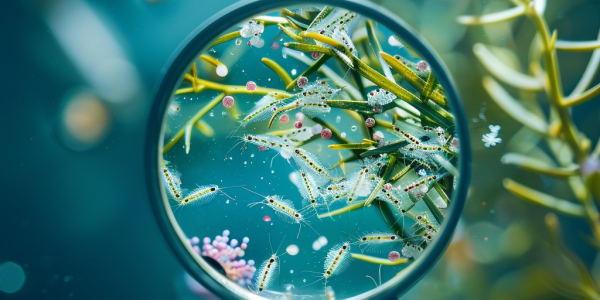Study Reveals Aquatic Organisms as Key Indicators of Environmental Change
A groundbreaking study by the University of South Australia reveals that chemical fingerprints from lesser-known aquatic organisms can serve as vital indicators of historical environmental changes. Led by Dr. Zoe Doubleday, this research highlights the cost-effective potential of using unique chemical signatures from species like sponges and marine mammals to monitor ecosystem health and predict future trends, paving the way for improved conservation strategies amidst climate change.
Engineered Proteins Enable Rapid Detection of Toxins for First Responders
Biochemists at the University of Wisconsin-Madison have developed innovative proteins that can detect harmful chemicals and toxins in minutes, enhancing safety for soldiers and first responders. This groundbreaking technology, known as Sensor-seq, allows for rapid identification of substances like narcotics and opioids, revolutionizing emergency response and public safety.
Schneider Electric and One Click LCA Partner to Enhance Sustainability in Construction
Schneider Electric partners with One Click LCA to enhance sustainability in construction by providing accurate environmental assessments for MEP systems. This collaboration aims to reduce lifecycle carbon emissions and promote transparency in the AEC industry, addressing the urgent need for reliable environmental data. By integrating detailed MEP product data, they empower architects and engineers to make informed, sustainable choices, marking a significant step towards a greener built environment.
Honeybees: Nature’s Allies in Pollution Monitoring
Honeybees are emerging as vital allies in pollution monitoring in Canada, collecting environmental data through their foraging habits. Recent research highlights their potential to analyze local pollution levels by examining honey samples, providing crucial insights into ecosystem health. This innovative approach not only emphasizes the importance of honeybees in environmental stewardship but also fosters community engagement in combating pollution.
Study Reveals Alarming Effects of Microplastics and PFAS on Aquatic Ecosystems
Recent research from the University of Birmingham reveals the alarming effects of microplastics and PFAS on aquatic ecosystems. Published in Environmental Pollution, the study shows that the combination of these pollutants leads to severe toxic effects on water fleas, highlighting the urgent need for further investigation and action to combat plastic pollution and harmful chemicals in our water systems.
Study Reveals Impact of Ocean Noise Pollution on Oysters and Marine Ecosystems
Recent research from the University of Adelaide reveals that human-generated noise pollution is disrupting marine ecosystems, particularly affecting native oysters. The study emphasizes the critical role of natural sounds in the ocean for the settlement and survival of baby oysters, highlighting the detrimental impacts of anthropogenic noise from shipping and industrial activities. As conservationists call for action, understanding and mitigating noise pollution is vital for preserving marine biodiversity and ecosystem health.
Study Finds Trees Drive Air Pollution in Downtown LA
A groundbreaking study led by the University of California, Berkley, has revealed that urban tree canopies in Los Angeles are contributing to high air pollution levels despite reductions in vehicle emissions. The research highlights the impact of urban trees on pollution levels, with California’s 173 million urban canopy identified as a hidden source of pollution. Dr. Pfannerstill warns that rising temperatures escalate biogenic terpenoid emissions, contributing to ozone and secondary organic aerosol formation in cities like Los Angeles, San Francisco, San Diego, and Sacramento.
Pollution and Crime: The Correlation Revealed
Recent research is revealing a concerning correlation between exposure to pollution and an increase in criminal behavior. Studies show that pollutants like particulate matter, lead, and noise can impair cognitive function, increase aggression, and reduce impulse control, potentially contributing to higher crime rates. Addressing environmental pollution is crucial for creating a more just and sustainable society.
Study Finds ‘Biodegradable’ Teabags May Not Degrade Easily, Poses Potential Harm to Terrestrial Species
Recent research from the University of Plymouth reveals that teabags marketed as ‘biodegradable’ may not easily deteriorate, posing harm to terrestrial species. Teabags made from polylactic acid (PLA) and cellulose-PLA blends showed limited degradation in soil, with some components persisting. The study emphasizes the need for clear disposal instructions on packaging to prevent incorrect disposal practices and mitigate environmental impacts.
States in the US with Highest Financial Risks from Weather-Related Events
Climate change poses financial risks to states in the US due to environmental events like tornadoes, wildfires, hurricanes, and flooding. SmartAsset study ranks Louisiana highest with $556 in annual damages per person, while Ohio and New York face lowest damages. Understanding these risks is crucial for planning and building resilience.










